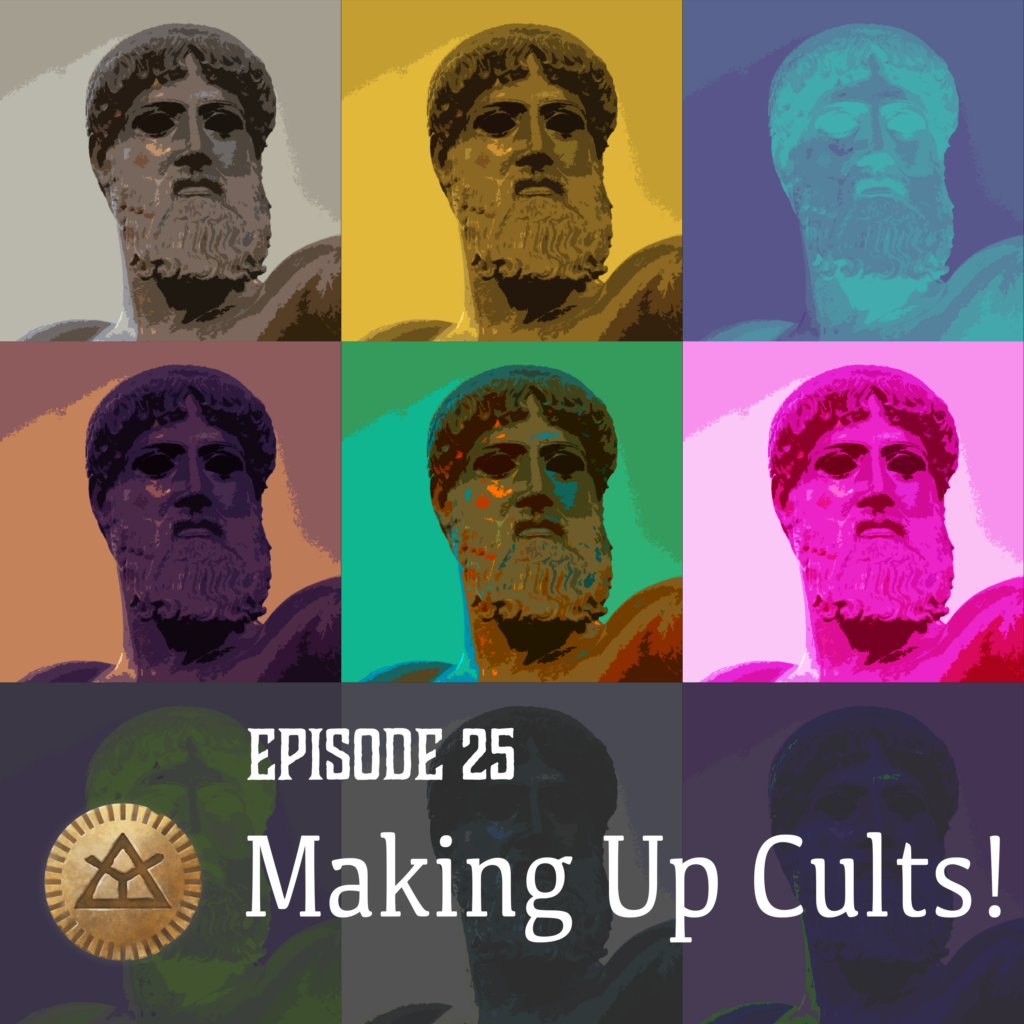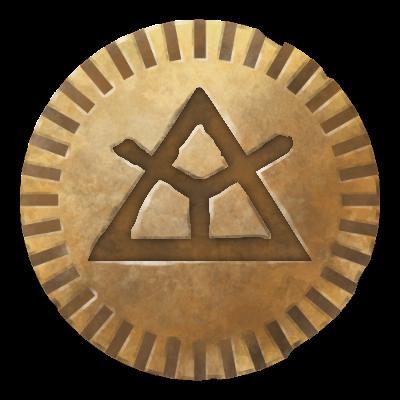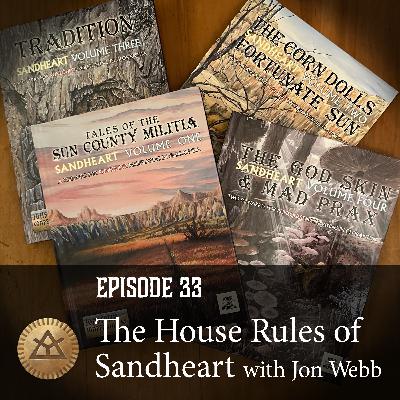Episode 25: Making Up Cults!
Description
 </figure>
</figure>Our guest for this episode is Austin Conrad, who last graced our podcast in episode 2, On the Road. Austin is the author of many things on the Jonstown Compendium, generally publishing under the “Akhelas” brand, while he is known as “Crel” on BRP Central, Discord, and social media.
Introductions
Austin is a contender for the most productive publisher on the Jonstown Compendium with his 24 issue Myth of the Month series that ran for the first two years of the Jonstown Compendium, culminating in the sizeable scenario booklet To Hunt A God.
Akhelas is the name of the setting Austin started writing in 2016 before the Jonstown Compendium even existed, and before he was even involved in Glorantha. The setting is inspired by Homeric epics and the tales of Herodotus, and especially Thucydides and the conflicts of city states.
The cosmology of Akhelas derives heavily from Platon’s Timeas, and the setting is kind of on the edge between Bronze Age and Classic Age. Little wonder Austin “took to Glorantha like a duck to water”.
When Austin is going to start publishing this animist city-state Bronze Age warfare stuff, he expects people to point to Glorantha as a parallel. Great minds…
Austin expects to self-publish his first novel maybe later this year, more likely next year.
Ludo mentions that Shawn and Peggy Carpenter have returned their publication Valley of Plenty, with new material added: extra detail, new cults, extra adventures. Like Austin, Shawn has announced a novel for next year.
To Hunt A God
According to Austin, To Hunt A God is a heroquest where your adventurers do the thing it says in the title.
Before we conclude this episode with this definitive statement, Austin expresses his sense of accomplishment after getting this book into print on demand. He urges everybody to sit down and publish their stuff in the community content program. More stuff is great, and sitting down with your own book is a spectacular experience. Getting it print-ready took Austin about a week of work and then six weeks of waiting.
To Hunt A God contains a new cult for players, Hrunda. Austin had the goal to provide a player cult that people would want to belong to. Another major section of the book is a temple site dedicated to Hrunda and a number of associate beast totem cults with their human and animal worshippers.
The second half of the book contains the adventure. It sets off with a religious festival attended by the player characters. We discuss the location of the temple and the Old Woods in relation to Esrolia (west of the Skyreach range, north of Longsiland, the easternmost outreach of the Arstola forest).
Austin calls out both similarities and differences with the Wild Temple in Beast Valley. The temple in the Old Woods is more modest in extent, concentrating all its important holy places in a small area.
Austin explains that the adventure originated from his RuneQuest Glorantha campaign situated in the city of Sylthi in Esrolia. We talk a bit about how this piece of Arstola is different from the rest of the forest, and where to find information.
Austin admits that he still needs to catch up listening to our podcast. Ludo is not sure he has his priorities straight.
Making Up Cults
Ludo elaborates on how cults are the defining difference between RuneQuest Glorantha and other fantasy games and settings, and how sooner or later every group or GM will leave the canonical selection of cults behind for their own special thing. Even with the upcoming publication of the Cults of RuneQuest books (“more cults than you need”) you will sooner or later find your own niche cult. Jörg points out that already the third adventure in the Colymar Adventure book gives the player characters a choice about how the deity of the backstory will turn out, showing the official endorsement of this practice. Ludo counters with the Quickstart adventure which will lead to some new cult activity if the players go for mostly non-violent solutions.
Austin confesses that he is a great fan of making up cults. GMs as well as player tend to buy in to their game by adding a personal touch. In mainstream D20 games people make their own character class. In RuneQuest set in Glorantha these are the cults. Austin talks about numerous cults and deities that he wrote up for his Esrolia game. Ludo teases that people might understand this as a backlog of upcoming books, but Austin quickly denies anything within calling distance. There was a reason he needed 18 months to finish To Hunt A God after having hit a hard start into 2022, and re-entering a project with a thousand pages of notes after such a break won’t produce results quickly. Austin compares his creative process to that guy who has a disassembled car project in the garage he religiously visits, only to drink a beer or two rather than put in some effort.
Austin also explains how him turning to a full time writing job means that people need to buy his books if they want the Esrolia project to proceed, as there will be fewer commissions outside of his Glorantha writing.
Inspired by the Red Book of Magic
The Red Book of Magic is the collection of all the Rune Spells and special Spirit Spells from the Cults Books (at least at the time of its publication back in 2020, when we naively thought that the Cults Books would be just around the corner). Because of the delay of the less typical cult write-ups, Austin states that a spell without a known cult has no obvious way to use it in your game: a collection of toys without giving you the instructions how to use them.
One spell that caught Austin’s attention (and affection) was Proteus, a spell that allows the caster to change their shape into a shape that they have devoured earlier. While owners of RQ3 Gods of Glorantha would be able to find that this is a Triolina spell, people without this long out-of-print supplement have no way to associate that spell with a cult or to make use of it. Austin saw the Movement Rune, originally owned by Larnste, the god of Change.
Austin complains that the river cults are “boring as hell”, which is why he gives the river cults in his area access to shape-shifting. Austin had a player whose thief character could shape-shift, and it was a disaster, and they had a great time.
In Austin’s version, the river cults would give their worshippers three shapes that they could acquire with Meld Form (an Enchantment which doesn’t cost POW). These forms were bull, ram, and crocodile (actually baby crocodile).
Austin suggests that use of this spell combo could make Hsunchen shape-shifting magic less overpriced, with a beast partner sensing their approaching death potentially volunteering to give their shape to a human partner.
In summary, if you want to give access to an orphaned spell, how do you fit it into the setting in a way that is kind of unusual and unexpected.
Ludo describes how playing the scenario that he later published as Bog Struggles the players got access to the spirit of the River Horse, It seems to be very common to encounter spirits or forgotten godlings whose magic may get accessible as a spirit cult.
It is a question “What do I get in return for joining this cult”, and Austin points out that this mind-set was typical for the ancient (and earlier) periods. Cult practices were of a transactional nature – I give you this cow and you stop messing up my harvest by sending (pr withholding) rain. Deities were powerful forces, but not role models, unlike in modern monotheism.
Ludo calls the deities selfish assholes who mess with people and stuff, make children with whatever and demand worship and adoration. Jörg compares the deities to service providers who need to be propitiated in order to get the necessary service. We go on talking about Orlanth as Comcast deep in Balazar… We talk about how you only get the right kind of lightning when within reach of at least one of the holy mountains.
Types of Cults
The RuneQuest rules recognize several layers of cults by importance as well as by the target entity.
Spirit Cults
Spirit cults are a place to start if you want to screw with cults. They found very naturally upon exposure of the adventurers to the cult entity.
Austin wonders whether spirit cults are regularly established via adventurer types or whether they may






